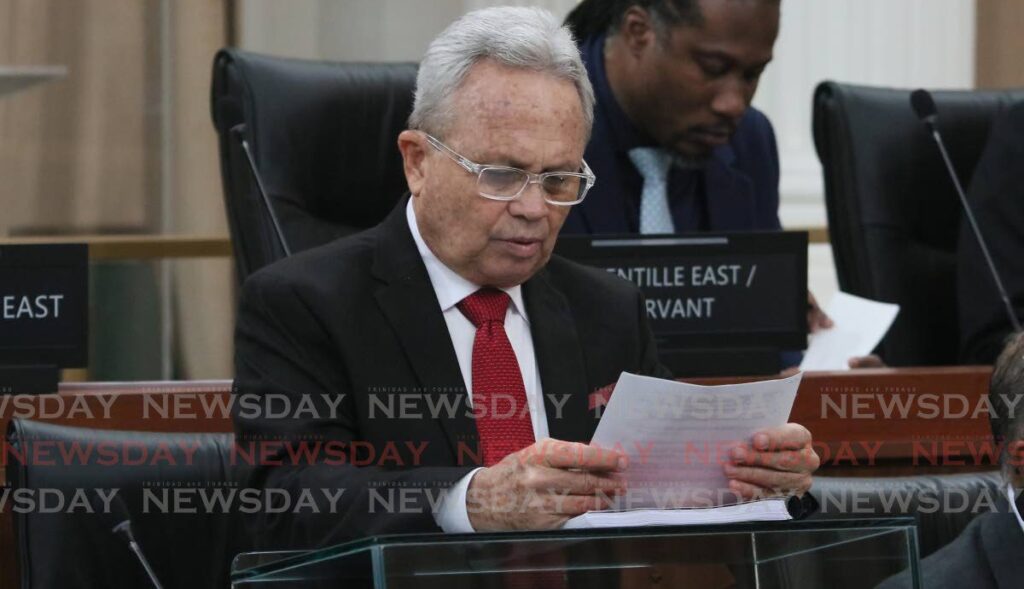THE House of Representatives has approved the nominations of three people to serve in top positions in the Trinidad and Tobago Revenue Authority (TTRA).
The approvals came on April 12 when Finance Minister Colm Imbert debated three motions to appoint Patsy Latchman-Atterbury, Helen Thomas-Brown and Riad Juman as the authority’s director-general, deputy director-general (domestic tax) and deputy director-general (customs and excise).
On the agreement of government and opposition MPs, Imbert debated the motions simultaneously. Latchman-Atterbury and Thomas-Brown’s appointments were approved by respective votes of 19-14. Juman’s appointment was approved by a vote of 20-17.
When he debated the motions, Imbert said the trio were all suitably qualified for their respective positions. He gave examples of their respective qualifications.
Imbert said as director-general, Latchman-Atterbury has the dual responsibility of institutional building and strategic and operational leadership of the authority. He added that Latchman-Atterbury’s professional experience includes leadership roles in entities such as Scotiabank and the Bank of Nova Scotia.
“Based on these qualifications and experience, Mrs Latchman-Atterbury is highly qualified and suitable to lead in the position of director-general of the TTRA.”
On Thomas-Brown, Imbert said she is a career public servant.
“She currently holds the position of commissioner of inland revenue from 2022 to the present time.”
He said her responsibilities include leadership and strategic direction of the Inland Revenue Division’s operations with respect to tax administration.
Juman, Imbert continued, is a Deputy Comptroller of Customs and Excise and acted as Comptroller on several occasions. He said Juman has received local and foreign training in areas such as detection and combating of smuggling of illicit drugs, arms and ammunition.
The order to extend the deadline for implementation of the authority was also laid in the House on April 12. Earlier this month, Imbert said the deadline for the implementation of the authority was further extended. The new deadline is now April 30. The extension was gazetted on April 2 and signed by Imbert.
This decision comes after attorneys were advised by the Court of Appeal that a judgment challenging the operationalisation of the authority “will not be delivered by March 31.”
Attorneys for the State asked the court for an update, since Imbert had previously extended the deadline to March 31, and wanted to know when a decision was likely to be delivered “so that the minister may know whether it might become necessary to give consideration to a further extension.”
Imbert did so on April 2.
The Revenue Authority Act was proclaimed with an effective date of May 1, 2023, and was scheduled to take effect on August 1, 2023.
However, the Public Services Association challenged the lawfulness of the authority. The lawsuit specifically focused on Section 18 of the legislation, which President Christine Kangaloo proclaimed on April 24, 2023.
Initially, the deadline to do so was July 31. However, it was extended to November 30, 2023. On November 28, 2023, Imbert again extended the deadline to February 29, 2024, for “operational reasons.” It was extended again to March 31, on February 28, according to Legal Notice 46 of 2024.
In the lawsuit, the PSA, through its member and customs officer Terrisa Dhoray, is challenging the constitutional validity of the TT Revenue Act 2021.
She contended that certain segments of the legislation were unconstitutional, as they sought to interfere with the terms and conditions of employment of public servants currently assigned to the Customs and Excise Division and Inland Revenue Division.
She also claimed that the Government did not have the power to delegate its tax-revenue-collection duties.
The section gives public servants three months to decide on their future employment on the operationalisation of the authority.
Affected public servants can voluntarily resign from the Public Service, accept a transfer to the authority, or be transferred to another office in the Public Service.
On November 17, 2023, High Court Judge Westmin James dismissed the case. James ruled that tax collection was not a core governmental function that is non-delegable.
While he noted that taxation was a key source of a government’s revenue and that the process of assessing and collecting taxes is essential, he said there were currently instances of private entities being able to collect taxes on the government’s behalf.
In his ruling, James said the authority was “meant to be a semi-autonomous revenue authority.”
On February 7, Justices of Appeal Nolan Bereaux, Charmaine Pemberton, and Mira Dean-Armorer reserved their ruling on the PSA’s appeal.

